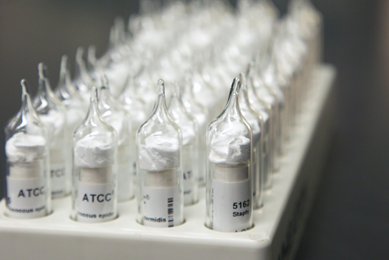Why it’s important
Genomic variation caused by bacterial stress related to culture conditions and preservation processing is a cause of concern as it could adversely affect the quality of downstream products and processes. For instance, genetic variability in bacterial reference strains could adversely affect quality control and release testing assays where scientists operate on the assumption that microbiological strains would behave in a similar manner as the reference strains. The accuracy of such assays is essential for identifying possible contamination in intermediate and final products developed by the food and pharmaceutical industries. Product and consumer safety could be at risk if genotypic variation causes the standard assays to behave differently.
What our research shows
Stresses related to preservation processing and culture conditions could have a significant impact on the genomic variation of bacterial cells. To understand how these stress-driven genomic variations could be mitigated, we performed a systematic study at ATCC to evaluate the genetic stability of the bacterium Escherichia coli strain Crooks (ATCC 8739) under different preservation conditions and continuous propagation to correlate stress conditions with genomic stability.4 The selected strain of bacteria is widely used in quality control and release testing studies under different United States Pharmacopeia (USP) methods. Next-generation sequencing techniques were used to evaluate and quantify genetic variability before and after preservation processing via lyophilization. Post-lyophilization propagation of the bacterial strain under various culture conditions was compared to the reference genomic data already in the ATCC Genome Portal. Standard bioinformatics strategies were implemented to identify the total number of variants, major variants, SNP counts, and indel mutations.
Our study indicates that while we were successful in minimizing preservation-related stresses during lyophilization through effective formulation design, increased number of passages did have a significant effect on the genetic variability. To our surprise, we found that propagation of the strain in nonselective medium even for passages more than three generations resulted in significant genomic variation. While we are further investigating ways to minimize genomic variability while in culture, it is clear from our preliminary research that restricting the use of model microorganisms to low-passage numbers is critical for preventing the introduction of genomic variability in reference strains. In turn, this practice may be instrumental for preventing significant phenotypic changes in important traits within bacterial populations.
How we can help
Genetic drift in reference microorganisms is a significant threat to the quality standards that are required for repeatability and fidelity of the release testing assays. At ATCC, we are looking at novel ways to preserve reference strains that ensure low genetic variability of the reference microorganisms. Our microbial strains are preserved using a seed lot system, enabling us to maintain strains at low passage to ensure reproducibility and equivalency of results across time and among laboratories around the world. Our cultures are also meticulously authenticated and characterized using a polyphasic approach that includes genotypic and phenotypic analyses. At ATCC, we realize the important role the reference microorganisms play in the pharmaceutical, food, and drug industries as well as in basic research. We are always pushing the boundaries of applied research to ensure availability of high-quality reference microorganisms.
Did you know?
ATCC provides hundreds of quality control strains recommended as test microorganisms for evaluating pharmaceuticals, cosmetics, food, water, and more.
Meet the authors
Jyoti K Jha, PhD
Senior Scientist, BioNexus Cryobiology, ATCC
Dr. Jyoti K. Jha is a research and development scientist with over 15 years of experience in molecular biology and biochemistry of microbes. He previously worked at Elanco and Rise Therapeutics as a senior scientist for microbial product development. Currently, Dr. Jha develops and improves the mode of microbial preservation formulation and format for new products. Dr. Jha received a PhD from the University of Calcutta in Biotechnology and performed post-doctoral work at National Institutes of Health (NIH/NCI). Dr. Jha has published more than 25 peer reviewed papers as lead and/or co-author.
Nilay Chakraborty, PhD, MBA
Principal Scientist, BioNexus, ATCC
Dr. Nilay Chakraborty is the BioNexus Foundation Principal Scientist at ATCC. He is an expert in the area of biopreservation and currently focuses on strategic development of innovative products at ATCC. An engineer by training, Nilay received his MBA from Indian Institute of Engineering Science and Technology and PhD from University of North Carolina. He developed several innovative technologies on biopreservation and cell-based technologies during his tenure at the Center for Engineering in Medicine in Harvard Medical School, Massachusetts General Hospital and Shriners Burns Hospital. Prior to joining ATCC, Nilay was a tenured Associate Professor at University of Michigan, Dearborn, and served as the Provost Fellow and Chair of the Research Committee for College of Engineering at University of Michigan. He has designed and developed several programs at the University of Michigan that focused on success of first-generation college students. Nilay served as a PI of several Federal Research Grants and served as a reviewer for Federal Scientific bodies including NSF and NIH. He has multiple patents and has actively worked in the area technology translation area by creating two successful startup businesses. At ATCC, Dr. Chakraborty is developing a core group centered around advancing ATCC’s core competencies in preservation sciences and strategic development of innovative biological products that leverages recent advances in preservation technology and bioengineering.
Cara Wilder, PhD, ELS
Senior Scientific Writer, ATCC
Dr. Wilder is a Senior Scientific Writer at ATCC. She has a PhD in Microbiology with background experience working with several pathogenic bacterial species in both in vitro and in vivo environments. Dr. Wilder is the author of numerous publications on varying topics of scientific relevance, including quality control, microbial contamination, assay development, proficiency testing, and multidrug resistance.
Explore our related resources
Genetic Stability of Microorganisms During Preservation and Propagation
This is a poster presented at the 2023 SIMB Annual Meeting that showcases the effects of preservation and propagation on genetic stability.
More Poster
Poster
The Importance of Standardizing Lyophilization Techniques in Microbial Preservation
This is a poster presented at ASM Microbe 2023 that highlights the need for optimizing lyophilization formulations for microbial storage.
More Technical document
Technical document
Reference Strains: How Many Passages are Too Many?
This technical document will attempt to clear up some of the confusion about passage and microbial culture maintenance and provide some definitions and recommendations.
MoreReferences
- Barrick JE, et al. Genome evolution and adaptation in a long-term experiment with Escherichia coli. Nature 461: 1243-1247, 2009.
- Somerville GA, et al. In Vitro Serial Passage of Staphylococcus aureus: Changes in Physiology, Virulence Factor Production, and agr Nucleotide Sequence. J Bacteriol 184(5): 1430-1437, 2002. PubMed: 11844774
- Duangurai T, et al. In vitro passage alters virulence, immune activation and proteomic profiles of Burkholderia pseudomallei. Sci Rep 10: 8320, 2020. PubMed: 32433516
- Jha JK, et al. Genetic Stability of Microorganisms During Preservation and Propagation. Poster presented at: SIMB Annual Meeting; July 30, 2023; Minneapolis, Minnesota, USA.